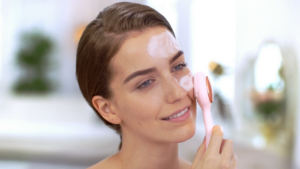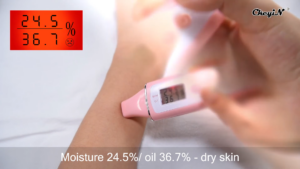In addition to desynchronizing our body clock, disrupting our skin clock would also compromise its intrinsic circadian rhythms, the natural 24-hour cycles that control a myriad of biochemical processes, including sleep-wake, hormone production, and metabolism, vital for skin health and functionality. Recent advances in research increasingly highlight the complex role of circadian rhythms in skin biology, explaining how the body’s internal clock directly controls skin repair, regeneration, and response to environmental stressors. When we capitalize on the powerhouse reaction that is circadian rhythms, that is when we truly can embark on optimizing skincare routine- because the reality is, this is skin health, this is optimizing the glow, the radiance, every way that is beneficial for the skin. We are here to tell you all about the science of Circadian Rhythms, and how they affect the health of your skin.
Circadian Clock and Skin Function
Our tissue has its biological rhythms, the so-called circadian clock, composed of clock genes and molecular pathways that control our cellular behavior over 24 hours. The latter function as internal timers that reset every day in response to the clock and allow the coordination of skin barrier repair, cell turnover, collagen production, and antioxidant defense mechanisms to external cues like light and temperature. Circadian control allows for an optimal action period and rest period to allow proper skin function, maintaining skin stability and strength.
Daytime Protection: To shield the skin from environmental stressors
In the daytime, the skin is busy protecting itself from environmental stressors such as UV rays, pollution, and oxidative stress. These circadian-controlled processes help fortify antioxidant defense and DNA repair systems in the skin, reducing the risk of DNA damage inflicted by UV radiation and hence preventing premature aging. Protect the skin from UV and environmental agents using the essential step of applying broad-spectrum sunscreen and SPF in the morning, as well as skin antioxidants and wearing protective clothes to prevent inflammation and photodamage that cause premature aging of the skin.
Cellular Regeneration and Renewal (Nighttime Repair)
While we sleep at night, the skin shifts into repair and regeneration mode in response to circadian-driven processes that maintain optimal levels of cellular turnover, collagen production, and moisture balance. Better blood flow and nutrient delivery to the skin help to enhance cellular repair from daily physical exposure, and in the process, it can help the skin look more radiant, have a much more polished texture, and heal more quickly. Skin care at night should focus on allowing your skin to recover and improve skin regeneration and the absorption phase of active ingredients including retinoids, peptides, and hydrating serums.
Impact of Circadian Rhythms Disruption on Skin
The most potent accelerators of skin aging: are disruption of circadian rhythms, like not enough sleep or night shift, or constantly with electronic devices light at night, circadianthe opposed to melatonin – the hormone of youth, the most powerful antioxidant and skin regenerator, made by your cells only when there is no light, and long distant flights when you fly into next time zone, circadian rhythms need one week to adjust to the local time of 12: 00. Loss of sleep is showed to disturb skin barrier function, decreased collagen synthesis, and weakening antioxidant defenses, which enhances skin sensitivity, dryness, inflammation and early sign of aging. Regular sleep time, low exposure to blue light at night, and mindfulness concerning when sleeping contribute to maintaining the synchrony of the circadian clock, which ensures the skin performs at its best.
Bespoke Skincare (Designed for Your Circadian Rhythms)
When your skincare routine is tailored to your circadian cycle, you maximize effectiveness and give skin the greatest amount of support as it transitions through the flip-in of the internal day-night switch. Morning routines are all about prevention and preservation employing SPF, anti-oxidants, and light-weight moisturizers to guard against the daily onslaught. Night routines focus on rebuilding and rejuvenation through the use of retinoids, peptides, and moisturizing solutions for maximized skin refreshment. Adapting skincare products and active ingredients to sync with the skin’s natural 24-hour cycles not only improves how well it works but helps to maximize the process to build skin resilience and nourish, healthy, and even skin over time.
Conclusion
The science of Chronobiology reinforces the importance of time and synchrony in maximizing the health and performance of our skin. By learning how circadian-driven mechanisms affect the repair, defense, and renewal functions of skin in the day-night cycle, consumers can plan their skincare to benefit from the natural timings and contribute to building an advanced skin health and wellness resiliency, in longevity. The premise of this clock-based skin care, from morning protection to night-time repair, is that it truly works with your body’s natural rhythms to facilitate a strong, healthy skin structure that can fight off aging and keep the skin looking as bright and fresh as possible, while also protecting against environmental stressors. By incorporating circadian-based skincare principles, one can enhance their overall beauty and maximize their health with a comprehensive plan that is in harmony with the body.








